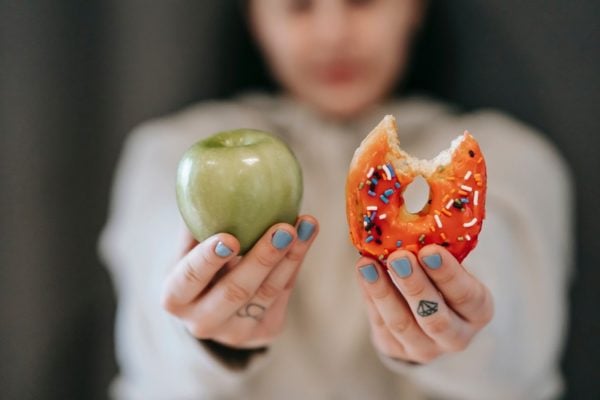By Staci Gulbin, MS, MEd, RD
Staci Gulbin is a registered dietitian with BumpVitamins.com. Staci is also a freelance writer, health editor, the founder of LighttrackNutrition.com, and the author of The High-Protein Bariatric Cookbook.
Staci has graduate degrees in Biology, Human Nutrition, and Nutrition Education from New York University and Columbia University, respectively. She has treated thousands of patients across many wellness arenas such as weight management, fitness, long-term care, rehab, and bariatric nutrition.
Postpartum Depression (PPD)
WHEN YOUR BABY (or babies!) come into the world for the first time, it can immediately change the course of your daily life. In many ways, this is a beautiful and exciting time when you’re able to welcome these new little ones into your family. However, for one in every nine women who give birth, postpartum depression (PPD) also comes along with those exciting changes (1).
And unfortunately, this serious issue is often set to the wayside while moms suffer in silence. Read below to learn more about PPD, resources for treatment, and how nutrition may help prevent it.
What is PPD?
PPD occurs when you feel emotionless, empty, or sad all or most of the time for two weeks during or after pregnancy (1,2). These emotions are different than baby blues. Baby blues do involve mood swings, crying, appetite problems, irritability, feeling overwhelmed, or trouble sleeping. However, these symptoms usually only last a few days to a week or two after your baby is born (1).
Symptoms of PPD more specifically include the following and can start up to a year after the birth of your child (1,2):
- Depressed mood
- Severe mood swings
- Excessive crying
- Withdrawing from family and friends
- Difficulty bonding with your baby
- Changes in appetite
- Insomnia or sleeping too much
- Overwhelming fatigue
- Intense irritability
- Hopelessness
- Feelings of worthlessness
- Severe anxiety
- Thoughts of harming yourself or your baby
- Recurring thoughts of death or suicide
If you experience these symptoms and they don’t fade within two weeks after delivery, please see your healthcare provider and seek help as soon as possible. For the more serious symptoms, like those involving potentially harming yourself or others, don’t wait two weeks… ask for help right away.
What causes postpartum depression?
PPD is not the mother’s fault. It can be caused by a dramatic drop in estrogen and progesterone in your body post-delivery (2). It can also be a result of a drop in thyroid hormones after giving birth (3). Other contributing factors may include the basic fact that you are sleep deprived and overwhelmed caring for your new baby. Risk factors for developing PPD include (2):
- A history of mental illness such as depression, postpartum or otherwise, or bipolar disorder
- Family history of depression or other mood disorders
- Recent history of stressful events such as pregnancy complications, illness, job loss, etc.
- You have multiple births, a baby with special needs, or an unplanned pregnancy
- You have difficulty breastfeeding
- There are relationship problems, financial problems, or a weak support system in your life
If you start feeling symptoms of PPD, it may be helpful to have your hormone and thyroid levels checked. This way if the levels are low, then you can receive treatment to help balance them better and perhaps relieve some of your symptoms.
How can I treat postpartum depression?
You can treat PPD by visiting with a psychotherapist to talk about your concerns and learn strategies to cope (2,3). It may also help for some to receive antidepressants to relieve some symptoms. Talk with your healthcare provider about how you can safely take such medicines while breastfeeding. Other important things to do that can help support recovery from PPD include (2):
- Accept help from family and friends so you can make time to care for yourself
- Connect with other moms so you can have someone to relate with about any concerns you might have and to get tips for self-care
- Avoid recreational drugs and alcohol, which can make mood swings worse
- Rest as much as you can
If you or someone you know is in crisis, please call 911 or the toll-free National Suicide Prevention Lifeline at 1-800-273-TALK (1-800-273-8255).
Can I prevent postpartum depression?
Research shows that in perinatal depression, which occurs right before and in the first weeks or so after birth, that lower levels of vitamin D and possibly other nutrients could increase risk (4,6). Also, a 2019 study shows that low levels of low plasma riboflavin (vitamin B2) levels and erythrocyte fatty acid composition could increase the risk of PPD (5). Therefore, moderate intake of riboflavin and omega-3 fatty acids may lower the risk of PPD.
Also, a 2017 study shows that low intakes of zinc and selenium may increase the risk of PPD. Researchers suggest that zinc could provide a serotonin reuptake effect that could reduce depressive symptoms (7). On the other hand, selenium could help maintain thyroid health and in turn positively impact mental health and mood.
How can nutrition prevent postpartum depression?
As the studies above show, certain nutrients show promise to reduce the risk of PPD. These nutrients include vitamin D, riboflavin, omega-3 fatty acids, zinc, and selenium (4,5,6,7). So, you can consume these nutrients in dietary supplement form and/or include the following foods in your diet (8,9,10,11,12).
- Vitamin D: cod liver oil, eggs, sockeye salmon, tuna fish, fortified orange juice, milk, yogurt, or cereal
- Riboflavin: beef liver, fortified cereals or oats, yogurt milk, clams, almonds, Swiss cheese, eggs, Portabella mushrooms, quinoa, or pink salmon
- Omega-3 fatty acids: flaxseeds or flaxseed oil, chia seeds, walnuts, salmon, herring, sardines, tuna
- Zinc: oysters, beef, lobster, Alaskan king crab, pork, chicken, fortified cereal, pumpkin seeds, yogurt, cashews, chickpeas, Swiss cheese, oatmeal
- Selenium: Brazil nuts, tuna, halibut, shrimp, enriched pasta, beef, turkey, chicken, cottage cheese, brown rice, whole-wheat bread, eggs, oatmeal, milk, lentils
If you choose to consume a dietary supplement to ensure you’re taking in these nutrients, then be sure to choose a supplement that is third-party tested and that may have certification by the National Sanitation Foundation (NSF) or registration by the Good Manufacturing Practice (GMP). Third-party testing will ensure purity and potency of the product, while NSF and GMP accreditations will let you know that safety standards are met when the product is manufactured (13).
A final word on postpartum depression
Postpartum depression is a serious issue that can impact the bonding between mom and baby as well as everyday life for moms. Therefore, it’s important to bring awareness to moms that if they feel these symptoms, reach out and ask for help. There is no shame in asking for help during this important event in your life.
If you’re trying to be proactive and prevent postpartum depression before giving birth, research shows that proper nutrition may help significantly. If you don’t know where to start when it comes to figuring out your nutritional needs, you can start by taking Bump’s online health assessment, and by asking your healthcare provider (or a registered dietitian with experience in prenatal and postnatal nutrition) for assistance. Asking for help will not only improve your health but also the quality of life for you and your baby today and for years to come.
References:
- Office of Women’s Health (last updated May 14, 2019) “Postpartum depression.”
- Mayo Clinic (September 1, 2018) “Postpartum depression.”
- National Institute of Mental Health (accessed March 12, 2020) “Postpartum Depression Facts.”
- Sparling, T.M., Nesbitt, R.C., Henschke, N., and Gabrysch, S. (December 2017) “Nutrients and perinatal depression: a systematic review.” J Nutr Sci., 6:e61.
- Lin, Y.H., et al. (May 2019) “Association between Postpartum Nutritional Status and Postpartum Depression Symptoms.” Nutrients, 11(6):1204.
- Trujillo, J., et al. (May 2018) “A systematic review of the associations between maternal nutritional biomarkers and depression and/or anxiety during pregnancy and postpartum.” Journal of Affective Disorders, 232: 185-203.
- Ghaedrahmati, M., Kazemi, A., Kheirabadi, G., Ebrahimi, A., and Bahrami, M. (August 2017) “Postpartum depression risk factors: A narrative review.” J Educ Health Promot., 6:60.
- National Institutes of Health Office of Dietary Supplements (updated August 7, 2019) “Vitamin D.”
- National Institutes of Health Office of Dietary Supplements (updated March 6, 2020) “Riboflavin.”
- National Institutes of Health Office of Dietary Supplements (updated October 17, 2019) “Omega-3 Fatty Acids.”
- National Institutes of Health Office of Dietary Supplements (updated March 6, 2020) “Zinc.”
- National Institutes of Health Office of Dietary Supplements (updated March 11, 2020) “Selenium.”
- The Public Health and Safety Organization (accessed March 12, 2020) “Supplement and Vitamin Certification.”
These statements have not been evaluated by the Food and Drug Administration. This product is not intended to diagnose, treat, cure or prevent any disease.
Tell your doctor, pharmacist, and other healthcare providers about any dietary supplements and medicines you take. They can tell you if those dietary supplements might interact or interfere with your prescription or over-the-counter medicines or if the medicines might interfere with how your body absorbs, uses, or breaks down nutrients.




